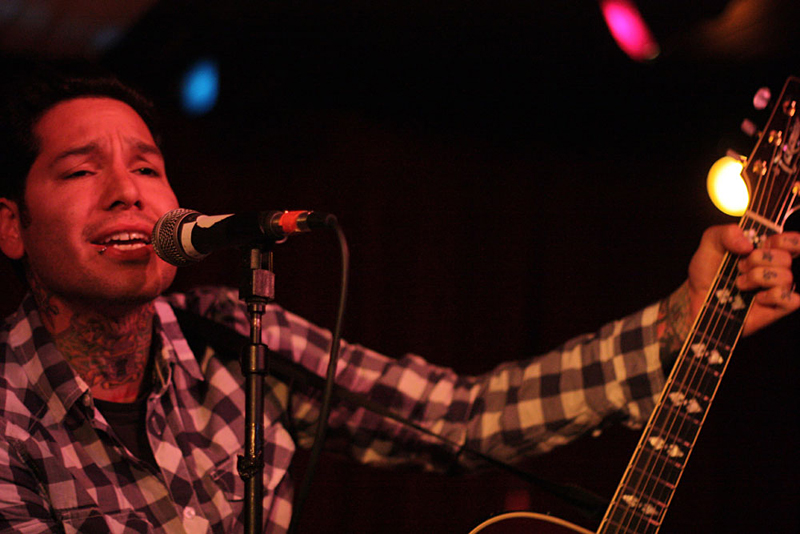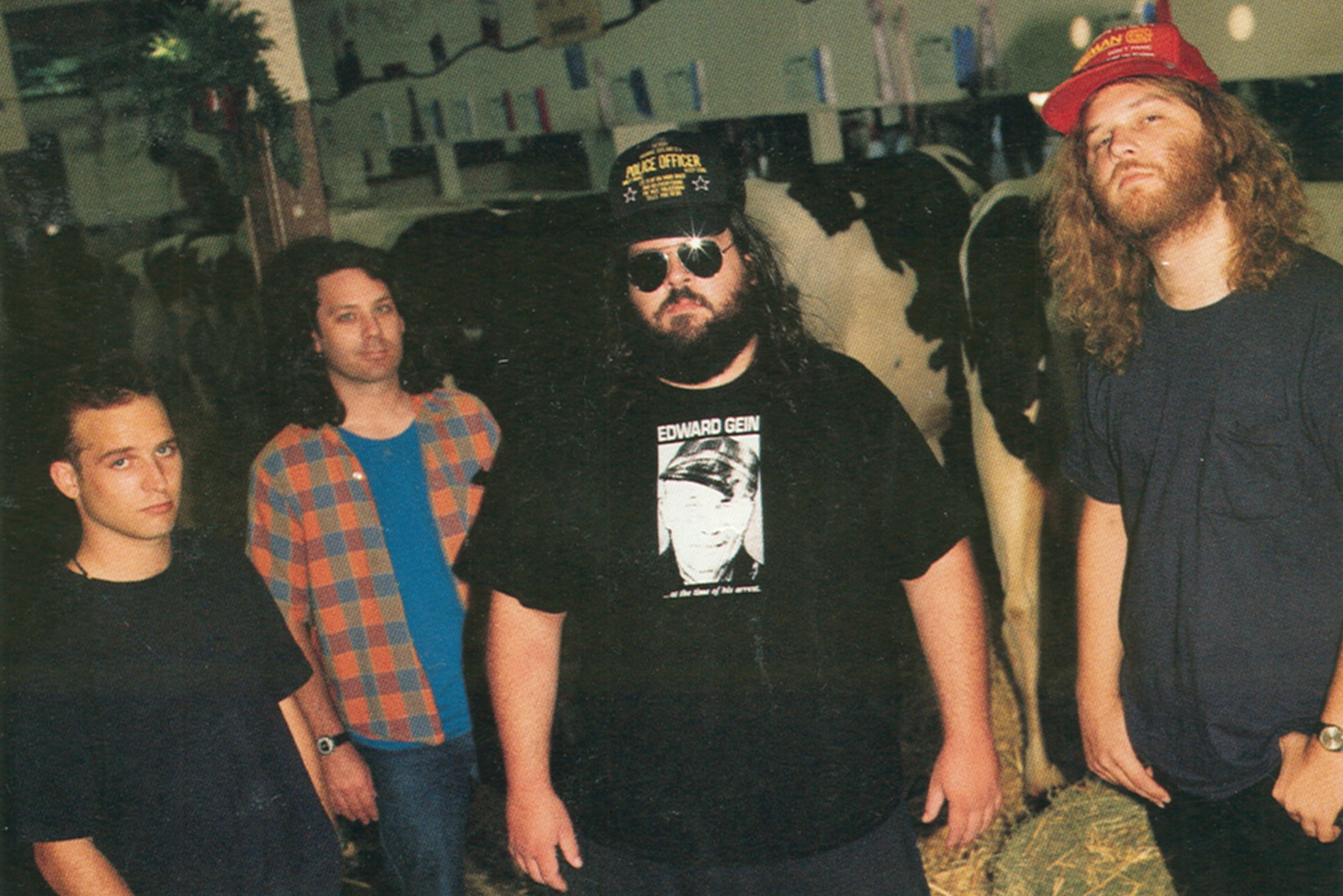With one band loading a drum kit into the van in the front yard, another in the kitchen drinking vodka out of plastic cups, and a third touring the recording studio on the house’s second floor, Monkey Trench Studios in Bremerton appears to be the epicenter of the naval town’s punk-rock scene. For Mike Herrera, the 34-year-old musician who owns the place, it’s just another Saturday night.
For almost 20 years, Herrera has been the singer and bassist in MxPx, a pop-punk trio of local boys done good who stormed out of Bremerton and went on to sell more than a million and a half records on the back of Christian values, catchy choruses, and songs about having fun and chasing girls. But nothing lasts forever, especially in the record business. And when Herrera’s bandmates, guitarist Tom Wisniewski and drummer Yuri Ruley, took jobs in the apprenticeship program at Bremerton’s shipyard last year, it signaled the end of an era for the band. With all three members married and Ruley a father, the rest of the band wanted the kind of job security that being a touring musician couldn’t provide.
“I needed a break too,” Herrera said. “I just didn’t want to say I needed a break. I didn’t want to be the guy that decided everybody else isn’t going to get a paycheck anymore.”
Admittedly, Herrera’s paychecks were a bit bigger than everybody else’s since he wrote the bulk of the songs. Unlike his bandmates, Herrera hasn’t gotten a proper day job. Instead he’s focused his energy on a number of other projects, including a second band, Tumbledown, a twangy mashup of country, folk, and punk sounds featuring acoustic guitar and upright bass. Though the band’s self-titled debut was released in 2009, Tumbledown’s genesis actually dates back to 2005 and the song “Late Again” from MxPx’s Panic LP. The song was different from anything Herrera had written before, and even features a guitar solo from future Tumbledown member Jack Parker. “After that,” Herrera said, “I knew what I wanted to do with Tumbledown.”
Though Tumbledown utilizes different instrumentation and explores different lyrical terrain than MxPx, the two bands don’t sound entirely different. Herrera’s still Herrera. Tumbledown has a rootsier feel that includes acoustic guitars and an upright bass, but Herrera’s songwriting style, which includes simple song structures and big hooks—to say nothing of his unmistakable, nasally delivery—looms large over both projects. It’d be easy to hear a Tumbledown song remade as an MxPx one, or vice versa.
Punk and folk may seem like strange bedfellows, but there’s a long history of players making the transition Herrera is attempting right now.
“When a punk rocker goes folk, he’s not necessarily wanting to go mellow,” said Chris Estey, a blogger for KEXP and Three Imaginary Girls, and a former employee of Tooth & Nail, the label that signed MxPx. “There are no commercial expectations for folk music, usually. The politics of hardcore and the politics of protest folk are synonymous,” which perhaps explains the spate of recent singer/songwriter records by punks who are reinventing themselves. Couple that with the evolution of musical tastes as middle age sets in, and you’ve got a long list of punks-turned-folkies: Chuck Ragan of Hot Water Music, Tim Barry of Avail, Dave Hause of the Loved Ones, Joey Cape from Lagwagon, and on and on.
“It was just circumstance,” said Tony Sly, singer for the long-running Bay Area punk band No Use for a Name, on releasing 12 Song Program, an acoustic solo record. “But I realize it looks really trendy.” With their drummer having a burgeoning winter business, he wanted to cut his touring schedule in half, which didn’t work for Sly, particularly with two kids at home. So he started writing songs that could be played without drums. “It changes your outlook on the world,” he said of fatherhood. “And it does make it seem like more of a job. You’re not fucking around anymore when it comes to money.”
As for Sly, there weren’t any career options other than music for Herrera, who started touring with MxPx at 18. He didn’t go to college, instead learning things the old-fashioned way by diving headfirst into whatever projects interested him. Aside from Tumbledown and his recording studio, Herrera also has a clothing line called Legionnaire that he runs with a partner; still performs with his longtime side project, Arthur; and has a solo tour currently in progress.
There are also more MxPx records in the works. The band’s classic lineup still plans to keep making albums, just not tour behind them. Though Herrera has come up with a solution for that, too: The MxPx All-Stars, which features Herrera and a rotating roster of players, including Chris Wilson of Good Charlotte and Kris Roe from the Ataris. “It was something that I invented because we had a tour booked in Japan,” Herrera said. “And then [Tom and Yuri] got their jobs and couldn’t do the tour.” The solution, albeit a complicated one, eventually made sense to the other members. Even though it would mean Herrera and some friends were out playing MxPx songs, the band would likely sell more records and merchandise than they would otherwise, which ultimately means more money for the band’s core members. “They seemed relieved, I think,” Herrera added, “because in a lot of ways they felt like they were letting me down.”
Now supporting Empty Bottle, his second LP with Tumbledown released last year via End Sounds, Herrera says it can be difficult to forge a new identity given his past successes, though the response from MxPx fans has been good. Colleen Malcolm, a 24-year-old MxPx devotee from Puyallup, says she likes Tumbledown even more than MxPx, whom she discovered at age 14. “The thing I like most,” she said, “is that they’re taking the best of the punk world and the best of the country world and combining it into their own sound. It’s so distinctive.” Although Tumbledown isn’t yet as well-established as his former band, playing shows can still be economically viable for the trio since the production and touring costs are so much lower. Dana Sims, El Corazon’s owner and booker, says that even though MxPx will sell out every time they play the club, Tumbledown’s smaller crowd is filled with older music fans who drink more, which means more profit for the club than a sold-out all-ages show where few patrons spend at the bar.
Chris Carrabba may have started the trend for his generation of punks, though his transition to singer/ songwriter was rocky. After leaving Further Seems Forever, the critically acclaimed Florida hardcore band he fronted, he found himself scorned by fans after launching the more introspective Dashboard Confessional, which subsequently kick-started started the emo revolution and ultimately brought Carrabba a new level of fame. Yet some of his old fans would argue he had to sacrifice his credibility in the process. That doesn’t appear to be true for Herrera, who plans to pursue both bands and a solo career simultaneously.
“I don’t feel like it has to be totally separate,” Herrera said, “because it’s never going to be. I’m not going to be the guy that forces everybody to never mention MxPx at a Tumbledown show. If you like MxPx, that’s good, because that’s me.”
What motivates Herrera is a mix of faith in his abilities and an inability to sit still. Even when MxPx was in full swing, he was never one to sit idly. He was always answering fan mail, always writing songs, always doing interviews. And the same is true now. He says he had faith that his hard work would eventually lead to success. Like Frank Turner, Rocky Votolato, and so many other songwriters with roots in punk rock who have reinvented themselves for their second act, Herrera’s wasn’t calculated; it was the natural evolution of his career. Though it’s unlikely he’ll achieve the same level of success he had with MxPx, he’s all right with that.
Call that evolution, too.








